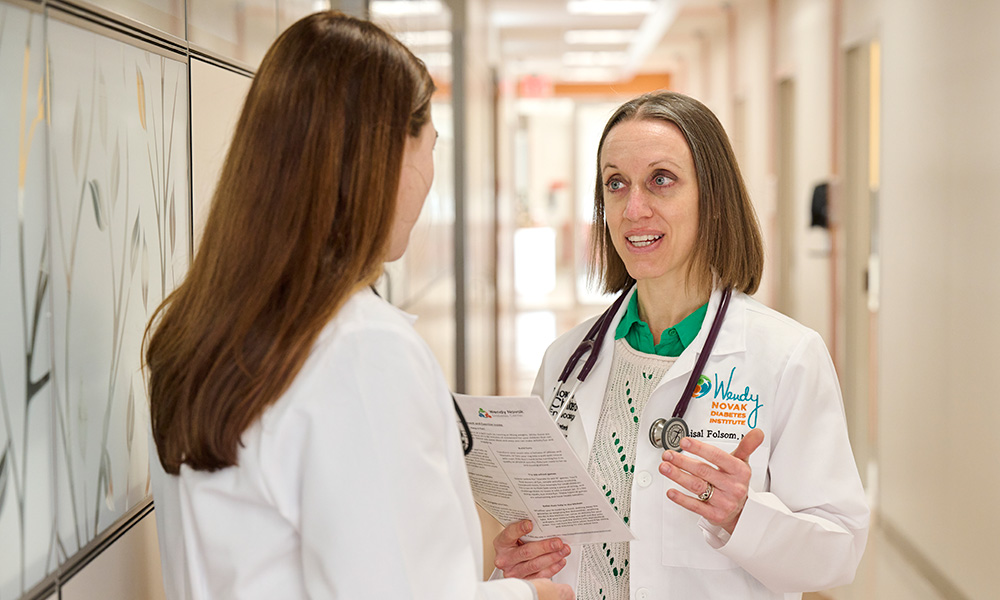For children with symptoms of a thyroid disorder, thyroid function testing can help with diagnosis

For children with symptoms of thyroid dysfunction, thyroid function testing can help with further evaluation and diagnosis.
Hypothyroidism affects 4.6% of the U.S. population, while hyperthyroidism is less common, with a prevalence of 1.3%.
Signs of thyroid conditions
Symptoms of hypothyroidism in a child may include fatigue, slow reaction time, constipation, coarse hair, dry skin, slow pulse and intolerance to cold. In children with severe hypothyroidism that has been present for a long time, slow speech, hoarse voice and facial puffiness may be present. In girls and young women, increased menstrual flow is sometimes associated with hypothyroidism.
Symptoms of hyperthyroidism can include goiter (enlarged thyroid gland), increased heart rate and/or blood pressure, increased appetite, hyperactivity, restless sleep, fatigue, difficulty concentrating, poor school performance, increased number of bowel movements per day, tremor and heat intolerance.
“Despite the enormous differences in symptoms, many of the diagnostic tests to check for hypothyroidism and hyperthyroidism are the same,” said Lisal J. Folsom, M.D., M.S., an adult and pediatric endocrinologist at Wendy Novak Diabetes Institute, part of Norton Children’s Endocrinology, affiliated with the UofL School of Medicine, and Norton Community Medical Associates – Endocrinology. “The first thing I want to do is check the thyroid function.”
Dr. Folsom, who is also an assistant professor of pediatrics and associate faculty in internal medicine at the University of Louisville School of Medicine, spoke on the continuing medical education podcast “MedChat” episode “Endocrine Pearls.”
Thyroid function tests used to diagnose thyroid disorders
Checking thyroid function may entail testing levels of thyroid-stimulating hormone (TSH), and free thyroxine or total thyroxine (T4) in the blood.
Hyperthyroidism is associated with low TSH and high T4. Conversely, if TSH is high and T4 is low, that fits with a diagnosis of hypothyroidism. When TSH is elevated and T4 is the normal range, it signals a condition called “compensated” or “subclinical” hypothyroidism.
Chronic lymphocytic thyroiditis (Hashimoto disease)
An autoimmune disorder called Hashimoto disease, which is also known as Hashimoto thyroiditis or chronic lymphocytic thyroiditis (CLT), is the most common cause of acquired hypothyroidism in the U.S.
Hashimoto disease is more common in girls than in boys, and more common in adolescents than pre-adolescents. Children with autoimmune (Type 1) diabetes are also at increased risk of developing Hashimoto disease.
Hypothyroidism also can develop when the brain does not produce enough TSH, a condition called central hypothyroidism.
Central hypothyroidism
Central hypothyroidism is sometimes associated with deficiencies in other pituitary hormones, including growth hormone, adrenocorticotropic hormone, luteinizing hormone, follicle-stimulating hormone, prolactin, oxytocin and antidiuretic hormone.
Central hypothyroidism can be inherited or may be the result of abnormal development of the hypothalamus or pituitary glands, trauma, or a tumor or treatment for a tumor. Central hypothyroidism typically affects girls and boys equally.
Hyperthyroidism, Graves’ disease and Hashitoxicosis
To test for hyperthyroidism, checking total triiodothyronine (T3) is recommended in addition to TSH and free or total thyroxine, according to Dr. Folsom. T3 is a thyroid hormone that plays an important role in regulating metabolism. With hyperthyroidism, T4 can be normal while T3 is elevated.
In a young, otherwise healthy person with hyperthyroidism, it’s also important to check thyroid antibodies looking for both Graves’ disease and Hashitoxicosis, which is the hyperthyroid state of Hashimoto thyroiditis.
The presence of TSH-receptor antibodies (TRAb) and/or stimulating immunoglobulins (TSI) point toward a diagnosis of Graves’ disease.
Elevated titers of anti-thyroid peroxidase (anti-TPO) and/or anti-thyroglobulin (anti-TG) antibodies without TRAb or TSI may point toward a diagnosis of Hashitoxicosis or Hashimoto thyroiditis.
Graves’ disease and Hashimoto thyroiditis are chronic autoimmune disorders. Hashitoxicosis is the transient hyperthyroid phase of Hashimoto thyroiditis.
Other less commonly ordered tests related to the thyroid include calcitonin, used to evaluate for C-cell hyperplasia and medullary thyroid cancer, and thyroglobulin, which is a protein produced by the thyroid.
Refer a patient
To refer a patient to Norton Children’s Endocrinology, visit Norton EpicLink and open an order for Pediatric Endocrinology/Diabetes Mellitus.

